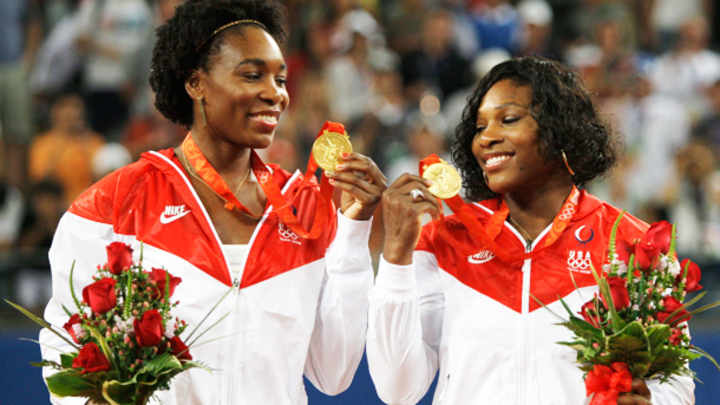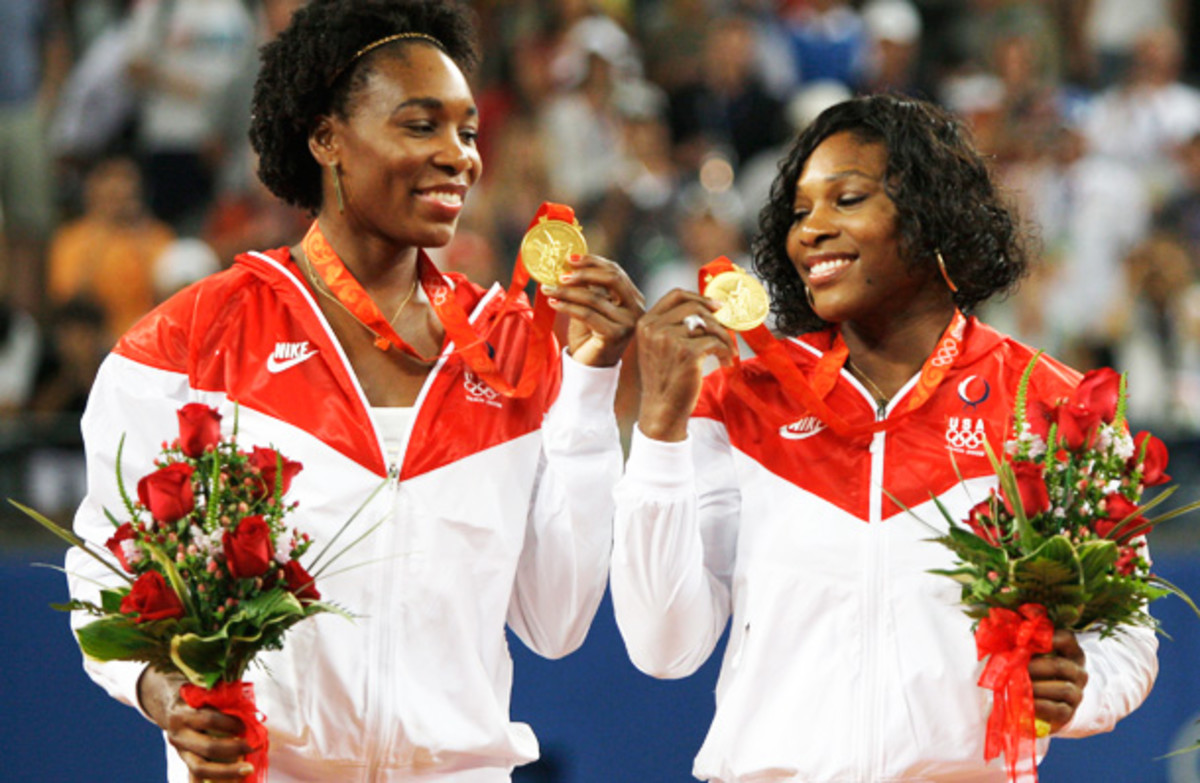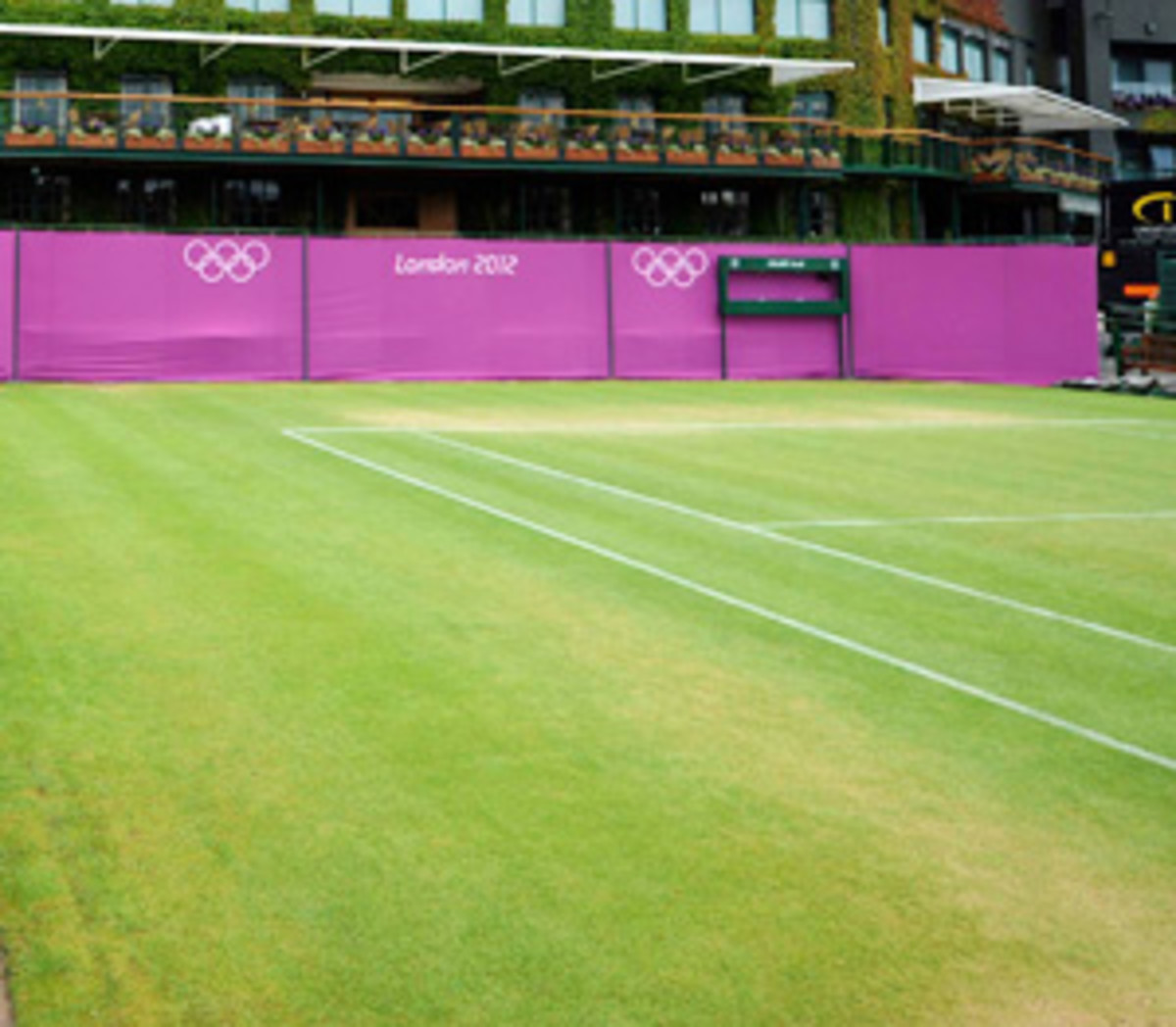The Toss: Merits of Olympic tennis

Venus and Serena Williams won the doubles gold at the 2008 Olympic Games in Beijing. (AP)

The 2012 Olympics are rapidly approaching, which means tennis is heading back to London for another run on the grass at the All England Club. Rafael Nadal's withdrawal shocked the tennis world on Thursday, but some top names are set to chase Olympic glory. This week, Toss regular Ben Rothenberg joins in on a debate that's difficult for tennis nuts to have.
Today's Toss: Should tennis even be part of the Olympics?
Courtney Nguyen: Let me preface this by saying that I'm incredibly excited for tennis at the Olympics this year. In fact, some might diagnose me with Olympic Fever, or -- after getting soaked to the bone by the rain at Wimbledon for two weeks -- Olympic Pneumonia. The colorful kits, the corporate signage, the lack of Pimm's, it all goes a long way in making me feel like I'm going to see something that isn't a Wimbledon redux.
But it is. And that's the problem. As the Games have crept closer I've been swept by the uncomfortable feeling that for better and for worse, tennis just doesn't belong there.
Tennis at the Olympics is a freak show. It's an aberration rather than a culmination. Much like soccer, the Olympics isn't even close to being the pinnacle of a tennis player's achievements. Soccer has the World Cup. Tennis has the Slams. The tennis season is built around those four tentpoles and success at the majors is how you're measured. Medals are nice and all, and they're probably really fun to dust off and show your friends at dinner parties, but Slam trophies lead to immortality, lore and legend.
Which is precisely why tennis just doesn't work at the Olympics. If the Games don't represent the pinnacle of success (or at least something close) for the participating athlete, the value of the Olympic medal across the board is diluted. It's easy to be fooled by all this talk of the glory and honor of "playing for your country", but in tennis, when aren't players playing for their country? Every time a player steps on court their country's flag flies next to their name. They're treated and discussed in groups (the Serbs, the Spaniards, the Russians), and many are already national heroes. Heck, we even have Davis Cup and Fed Cup every year. The notion that playing for your country at the Olympics somehow elevates the competition to a "5th Slam" doesn't make sense at all.
I think the fact that this year's event is being held at Wimbledon is fooling everyone (myself included) into thinking that this is a bigger deal than it is. Just two weeks ago we left the All England Club with epic performances by Roger Federer and Serena Williams to hoist the trophies. Now we're supposed to hit the reset button and pretend that this second go-around is just as big a deal because they splashed some color all the around the grounds and the grass looks as good as new. But there's nothing particularly unique about tennis at the Olympics. It's not an integrated team competition, which I would be 100 percent for. It's a typical tournament format with a 64-player draw where the players get to wear colorful kits in front of corporate signage. Don't we do this almost every week? The competition in and of itself isn't unique.
For the big-ticket Olympic sports (gymnastics, track and field, swimming, etc.), making the team, competing for a medal, and winning is the culmination of a life spent working towards this singular goal. For tennis, the Olympics is just another stop on the tour.
But I'd love to be convinced that it's something more significant than that, so give it your best shot, Ben.
Ben Rothenberg: First off, Courtney, major respect for trying to frame the lack of Pimm's as a potentially positive development. That couldn't have been easy for you.
I understand that it may seem like a Groundhog's Day situation because of how the schedule worked out. We were just at Wimbledon, and now we're back. I get why it might feel like a cheap sequel.
The All England Club got a bit of a makeover after Wimbledon to prep for Olympic tennis. (Reuters)

But that said, I actually really dislike everything that's been done to the All-England Club to "Olympicize" it. Despite being someone who proudly wore a pair of bright purple corduroys through much of my childhood, I think the new electric amethyst (as Serena might call it on HSN) backdrops look awful. Having the tennis competition played at hallowed Wimbledon was apparently one of the biggest selling points of London's winning bid for the 2012 Games, so I don't know why they decided it was prudent to de-Wimbledonize the grounds. Keep the strawberries, keep the all-white for all I care. This is probably going to be London's only Olympics this century, so why not soak up some local flavor?
It's already going to be a unique Olympics competition simply by virtue of the surface. Tennis is weird as an Olympic sport in that the competition's conditions can vary wildly from Olympiad to Olympiad, giving certain players a possibly unfair advantage (don't you think Nicolas Almagro and Sara Errani wish these Olympics were on clay like the ones in Rio 2016 will be?). Imagine if being in London meant that there was a double-decker balance beam, handballs made out of snooker balls, or that track races were done clockwise. That would be strange, and so only in that sense can I see the Wimbledon lawns being a drawback compared to what some more neutral surface might offer.
I also agree that Olympic tennis could be way more unique as a tournament than it is. We've talked already about changes we'd like to see in the selection process. Single-elimination gets pretty dull. Perhaps there could be some sort of double elimination, or perhaps round-robin format like they have in many of the other sports. Maybe even a team competition, as you suggested, in a modified World Team Tennis or Hopman Cup style. That said, I wouldn't want a team competition to completely replace the current disciplines, but rather just to precede them the way it currently works in gymnastics. Ultimately, the Olympics are about individuals, and it wouldn't be fair for someone like Marcos Baghdatis to have no chance whatsoever at a medal just because Cyprus couldn't field a full team.
So yes, there's a lot to be desired. But I haven't heard one single tennis player complain about any of those things. You know why? Because tennis players are excited to be Olympians -- even if they don't look it in theirprofilephotos.
Tennis players live a very isolated existence as sporting people, compared to many other sports with long off-seasons and geographic stability. But for those two weeks (or just one, as the tennis event is injuriously compacted for no defensible reason), tennis players get to be part of a global village of their peers from other sports, which is pretty cool. And not only that, the tennis players are perhaps one of the higher strata of competitors, as evidenced by the remarkable eight (now seven, after Nadal's withdrawal, but perhaps still counting?) players who have been officially nominated to carry flags at the opening ceremonies. Their physicality, so often under-appreciated by many sports fans, is honored by their presence at the Olympics. Because tennis is an Olympic sport, Agnieszka Radwanska gets to lead her country into the Olympics. If tennis wasn't, she'd be left at home watching her country march without her.
And for so many players from so many parts of the world, what they achieve (or fail to achieve) at the Olympics will trump the rest of their careers no matter what, simply because of the cache of the event. Jennifer Capriati once said that her friends back home didn't really know or care about Wimbledon or the French Open, but everybody immediately understood what a big deal it was when she won Olympic gold.
Eliminating tennis from the Olympics would therefore hurt the sport's standing in much of the world, especially countries which see the Olympics as more paramount than perhaps we do stateside. It's not a coincidence that the booms in Russian and Chinese tennis came after the sport was re-introduced to the Olympics in 1988. Without Olympic tennis, we would almost certainly would have no Li Na, and therefore no hundreds of millions of viewers for her final. Without that exposure and ever-expanding globalism, tennis might have been in danger of becoming a regional sport like cricket, which is arguably the track it was on in the pre-Olympic era when only a handful of nations ever produced contenders.
[polldaddy poll=6402784]
And even if it's not everyone's ultimate goal, is that so awful? Olympic gold isn't the ultimate goal for many athletes in a few other sports as well (men's hockey and men's basketball come to mind), yet the Miracle on Ice and the Dream Team are two of America's fondest Olympic memories. Let the athletes prioritize the sport's possible achievements as they see fit instead of just denying them the right to compete because others put their priorities on the majors.
Still, I do think the current ranking points allotted for the Olympics are a joke. For the ATP, a gold medal is only worth 750 points (less than is awarded for winning the non-mandatory Monte Carlo Masters 1000), and a silver is only worth 450 (less than the 500 the champion gets for winning the Citi Open in Washington which is being held the same week as the Olympics). Either there should be no points for the Olympics or it should be valued at well more than a Masters 1000.
The Olympics are great. They have a purity and peace-mindedness to them that makes them one of the cooler things humanity has pulled off in the last 100-plus years. They capture the eyes, hearts and imaginations of people (many not even sports fans) across the world in a way nothing else does. Why wouldn't we want tennis to be a part of that?
Nguyen: Well now you're making me out to be the Grinch who stole Nicolas Massu's two gold medals. Trust me, I don't want to wring out Andy Roddick's cap over the Olympic flame. If the Olympics want to be 100 percent more shrieky, all power to them. I know I'll enjoy the tennis competition no matter what. Then again, I'm a tennis wonk. Put Barbora Zahlavova Strycova and Anastasia Rodionova out in the parking lot of Best Buy and I'd still pay money to watch.
But for the common sports fan -- the one that decides that for 17 days every four years, handball is the most riveting sport that has even been invented -- what does Olympic tennis really accomplish? It's not a premier sport that will be aired on NBC (the tennis coverage will be carried on Bravo) which means it won't get massive exposure in the States, it's overshadowed by the traditionally popular Olympic sports (pommel horses, medleys, and 10 second sprints), and I fear that we might actually kill tennis in Britain by marching Andy Murray back into the All England Club so soon after this. The whole operation is as futile as a London weather forecast. Why bother?
Is it healthy for the sport to have the players grind through yet another event in an already impacted schedule and put their U.S. Open chances at risk every four years because of the Olympics? The players area all jazzed about playing this year and I think a lot of it has to do with the Wimbledon factor and that they don't have to fly halfway across the world for it. But what about in another four yard at the Rio Games, where the Olympics will actually be held a week later (August 5-21) and could shorten the prep time for the U.S. Open? Will the players be as high on the idea then? Without the allure of Wimbledon, I'm not sure. Furthermore, think about the effect the Games have on tournaments such as Montreal, Cincinnati, Stanford and Carlsbad. The big names have refused to commit and ticket sales (at least for Stanford and Carlsbad) have been pretty dismal. The Olympics make it a tough year to be a summer tournament.
As enjoyable as the tennis will be (I'm admittedly excited about the possibility of upsets with the men playing best of three through the semifinals) this year's tennis competition at the Olympics has that exhibition feel. Maybe that will change once it gets started, but my sense right now is that people are more excited and intrigued by the gimmicks than the actual tennis.
Rothenberg: Now you have me watching that Andy Murray speech again. That is not what my morale needed today, Courtney.
Yes, tennis isn't healthy, and a more crowded schedule is even less healthy. But in general, pro sports aren't healthy. Rafael Nadal (or his ghostwriter) wrote just that in his memoir Rafa, and now he's just pulled out of London with an injury. But tennis is hardly the most injurious Olympic sport. Think of all the sprains in gymnastics, all the horrible things that could go wrong in weightlifting, and all the small bruises that might happen if you got hit really, really hard with a ping pong ball. Athletes become athletes at their own risk, and the sort of non-life threatening injuries that could happen in tennis (as compared to something truly injurious like American football) aren't worth shielding people from.
And no, tennis won't get a lot of coverage on NBC (neither will handball, sadly, and handball is AWESOME). It's a peripheral Olympic sport, and that's the way it should be. Let the swimmers and runners and gymnasts have the spotlight, because this is the only time they ever get it.
But so long as tennis isn't trying to hog the spotlight like some other sport which has a bigger prize (I see you, women's soccer), what harm is it really to have it in the Olympics? Tennis players get to compete if they want to, which perhaps should be a privilege for all elite athletes in a global sport.
